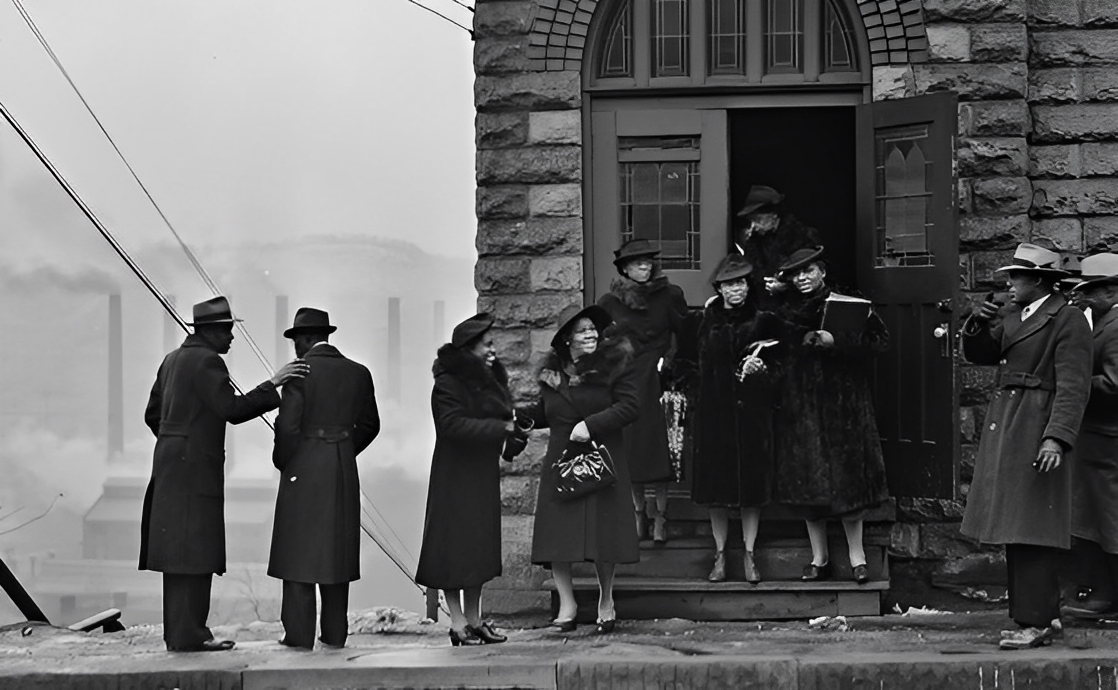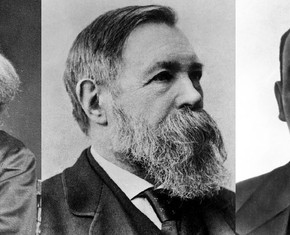The views expressed in our content reflect individual perspectives and do not represent the authoritative views of the Baha'i Faith.
In 1912, during his historic speaking tour across the United States and Canada, Abdu’l-Baha witnessed America’s deep racial divide first-hand and up close. In one New York speech, he said:
… why should man find cause for discord in the color or race of his fellow creature? No educated or illumined mind will allow that this differentiation and discord should exist or that there is any ground for it.
RELATED: Harlem, 1920: An Entire Black Church Embraces the Baha’i Faith
For years, Abdu’l-Baha had exerted his utmost influence, from far abroad, through contact with pilgrims and encouraging counsel in response to heartfelt letters of hopes and concerns, to promote unity between all races, religions, and nations as the keystone of the Baha’i Faith.
Abdu’l-Baha consistently emphasized harmony between the black and white “races” – so-called because, as the noted African American Baha’i, Alain Locke, who became America’s first Black Rhodes Scholar in 1907 and later led the Harlem Renaissance, had pointed out, “race” is primarily a social construct, rather than a biological reality.
Science has now proven that skin color, after all, is simply an adaptive characteristic, an evolutionary response to climate. In that framework, the Baha’i message of unity, from family relations all the way to international relations, views the racial crisis in America – which Shoghi Effendi, the Guardian of the Baha’i Faith, later called “America’s most challenging issue” – as paradigmatic.
If the egalitarian Baha’i principles, as applied in practice, could succeed in promoting better race relations between Blacks and Whites in America, that single achievement would have great symbolic as well as social importance. This ongoing “Universal Emancipation Proclamation” series has focused on the compelling history of Baha’i-inspired efforts toward racial unity in America, as episodic vignettes exemplary of how Baha’i public discourse on race relations has been translated into social action in real life, in order to inspire further advances in promoting ideal race relations in America and across the world.
In Part 70 of this series, we took a close look at a fascinating news story (recently rediscovered by Steven Kolins), “Growing Interest In Bahai Movement,” published in 1920 in The Washington Bee, an influential African American newspaper in Washington, DC, which reported, in part:
One of the most notable successes of the cause is in Harlem, where an entire church has become Bahai. At a recent meeting the pastor, Rev. Mr. Bolden, declared himself a Bahai. He said he had studied the Bahai cause and it had not made him less loyal to Christ; but he had discovered that this was a new Sun arisen in the horizon of truth. – “Growing Interest In Bahai Movement,” The Washington Bee (Washington, DC), Saturday, September 18, 1920, p. 7. https://www.genealogybank.com/newspaper-clippings/bahais-louis-gregory-fazel-mazandarani-william-randal-rev-richard-bolden%E2%80%A6/mnmpuoubuzbntwydznntyunvaprdpoep_wma-gateway016_1672518964106.
This remarkable story – of an African American pastor and his entire congregation in Harlem openly embracing the Baha’i message and its progressive principles – was preceded by the following paragraph, which provides a broader historical context:
Mr. William H. Randall, of Boston, prominent in the world of business and also a Bahai teacher, recently accompanied Jeniba Fazel Manzandarani on the Chautauqua circuit. He reports that at Chautauqua, Roycroft and a few other places the great message reached about fifteen thousand souls. So great were the interest and enthusiasm of the crowds that the speakers were almost run down in the eagerness of the crowds to get the free literature. During the fall and winter Mirza Fazel will tour the Western and Southern States. – “Growing Interest In Bahai Movement,” The Washington Bee (Washington, DC), Saturday, September 18, 1920, p. 7.
Earlier in 1920, another notable African American newspaper, The New York Age, drew attention to Pastor Bolden and his guest speaker, “Prince Fazel Mazandrani” [Mazandarani], in this news story:
The members of the Bahai held their last meeting for the summer. They plan to reopen in September. A splendid program will be rendered at the meeting of the Literary Society Sunday, July 4, at 4:30 p.m. by Pastor Bolden. His guests were Prince Fazel Mazandrani, who delivered an address in Persian which was translated into English by M. Sochrab; and the prince’s interpreter, Manocher Khan. These men recently arrived in this country from Persia and are making a tour of the continent preaching and teaching “Universal Love.” – “News of the Churches: First Emmanuel Church,” The New York Age, Saturday, 3 July 1920, Page 2, https://www.newspapers.com/clip/114244505/bahais-met-via-literary-society-at/.
Now let’s hear what “Mirza Fazel” or “Prince Fazel” himself had to say about the First Emmanuel Church:
When I arrived in New York last year, I found these Baha’is, who are the followers of Abdu’l-Baha, forming a circle, forming a society in Harlem, in the church of Reverend Bolden, a very progressive, colored minister. The society was called the Rainbow Circle, because this society had the all-inclusive principle of bringing all the races together; the white, the colored, the Persian, the Chinese, the Syrian, the Japanese etc.; all used to come together and sit side by side, and once a month they had an international dinner. – Jinab-i-Fadil Mazandarani, “Address to A.M.E. Church, Friday Evening, 21 June 1921 — A.M.E. Church, 32nd and Gray’s Ferry Road, Philadelphia, Pa,” Jináb-i-Fádil Mazandarání in the United States, https://bahai-library.com/anon_mazandarani_united_states.

So who were the Rev. Richard M. Bolden, a pastor who was also publicly known as a Baha’i, and, Jinab-i-Fadil Mazandarani, the Persian Baha’i and scholar whom Abdu’l-Baha sent to America? Let’s start with Rev. Bolden, who founded Harlem’s First Emmanuel Church in 1913 and later became a Baha’i. Rev. Bolden’s distinguished photograph appears in a 1916 front-page news story, “High Honor for Rev. R.M. Bolden. Thrifty Minister Delegate to Defense Convention. Well Known Civic Leader,” which provides a brief biography:
Founder of First Emanuel [sic] Church Recognized by Mayor Mitchel of New York as Man of Action and Constructive Ideas — Attends National Defense Gathering at St. Louis.
New York. — The Rev. Richard Manuel Bolden, able minister and public spirited citizen of this city, is the only representative of our race holding membership in the national defense committee. He was appointed by Mayor John Purroy Mitchel and has been active in the work since his appointment in December, 1915. …
The colored people of this city and state are much pleased with Mayor Mitchel’s selection of the Rev. Mr. Bolden as one of the delegates to this important conference. It is also very gratifying to the race throughout the country to note this just recognition of one of its number, who is fully capable to serve and worthy of the honor thus conferred. The Rev. Dr. R. M. Bolden was born near Marlon Station, Somerset county, Md., March 1, 1878. His early education was with difficulty obtained In the public schools of his native home, as he only had the opportunity of being in school three months each year for five years. He worked on a farm and in the oyster business from nine to eighteen years of age. At twelve he felt called to the gospel ministry, but it was not until 1896 that he Joined the A. M. E. Zion church of Providence, R. I.
His zeal for knowledge, his industry and honesty, won for Mr. Bolden many strong friends among both races in Providence. For a time he served as a coachman for Dr. Lester S. Hill, through whose generosity he was enabled to attend the Providence high school. Prior to his death Dr. Hill requested that Dr. Bolden should have charge of his funeral. The Rev. Mr. Bolden performed this last wish and duty with great credit. Upon the advice of the Rev. J. F. Hill, Mr. Bolden’s pastor, and Bishop Hood he entered Livingstone college, from which he was graduated. During his student days at Livingstone he was admitted to the Western North Carolina conference.
In 1913 Dr. Bolden went as ministerial delegate of the A. M. E. Zion church to the World’s Sunday school convention held at Zurich, Switzerland[.] While abroad he visited most of the principal cities of England, Germany, Belgium, Holland and other countries. Dr. Bolden is the founder of the First Emmanuel church, 105 West One Hundred and Thirtieth street. He is the author of the “Creed and Covenant of the Emanuel Church In the World.” The rapid growth and the manner in which this church is sustained demonstrates the fact that the day of miracles has not passed. To study the man and his work will inspire any godly mind. –“High Honor for Rev. R.M. Bolden. Thrifty Minister Delegate to Defense Convention. Well Known Civic Leader,” The Twin City Star (Minneapolis, Minnesota), Saturday, 11 March 1916, Page 1, https://www.newspapers.com/clip/115565729/later-bahai-rev-r-m-bolden-appointed/.
In the next article in our series, we’ll learn more about “Prince Fazel,” sent from Persia by Abdu’l-Baha, who was invited as a guest speaker by Rev. Bolden to the First Emmanuel Church in Harlem.

















Comments
Sign in or create an account
Continue with Googleor